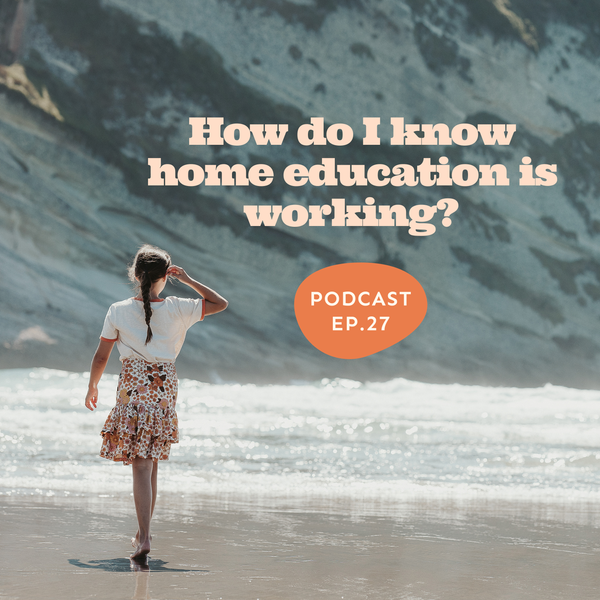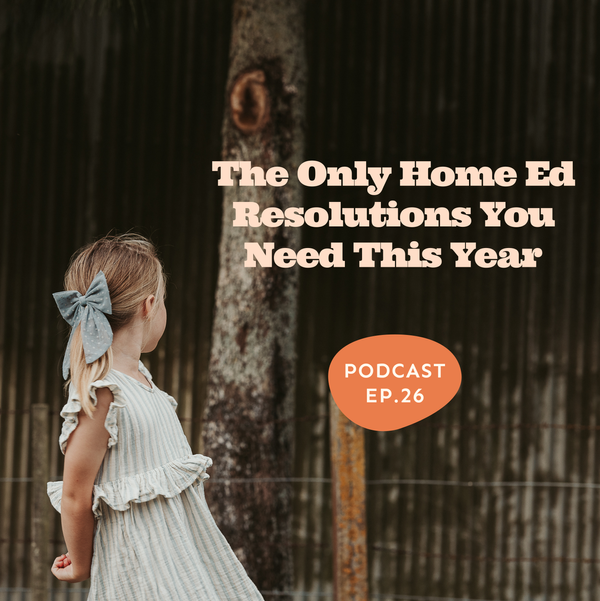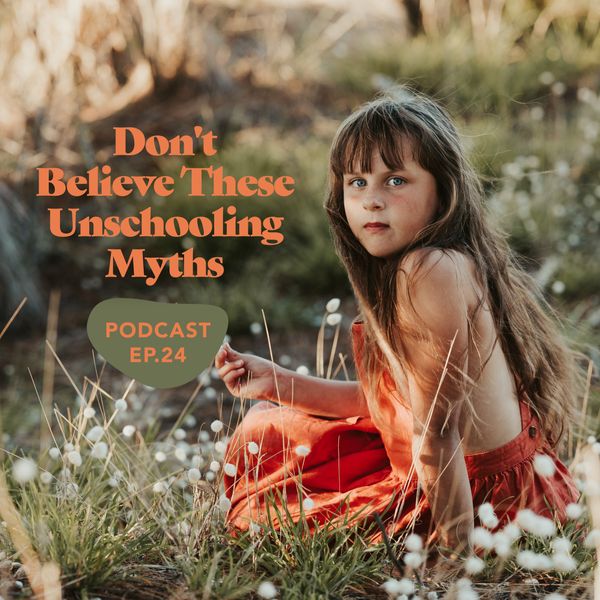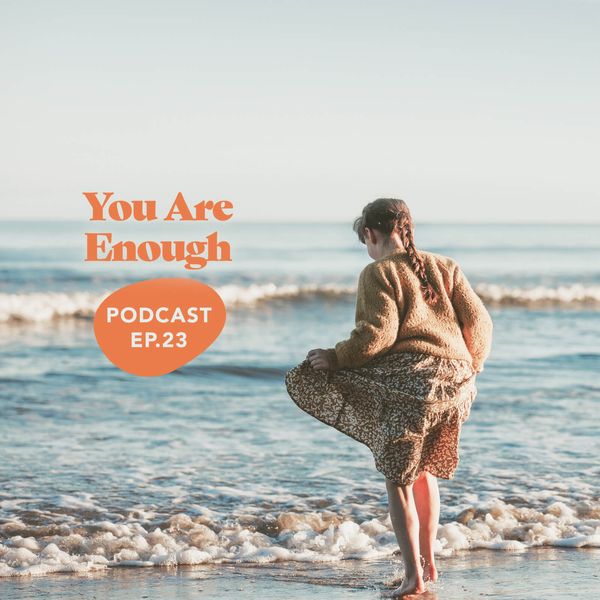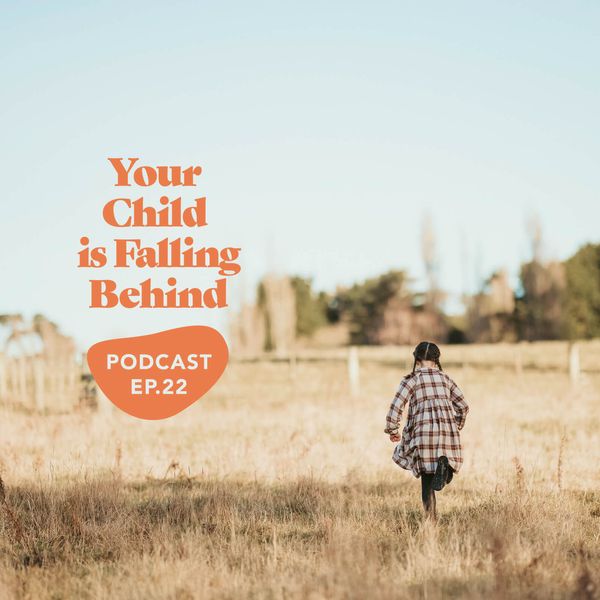In this episode I want to help you build your de-schooling muscle. The process of taking everything you know about education, wiping your mental slate as clean as possible, and coming at the whole idea of how children learn as fresh as you can.
To do that, I want to take you through five commonly held beliefs about education and childhood. Through this conversation, you will grow progressively more aware of ideas you’ve probably held since you were a child. Ideas that have far less substance than you think. And you will grow progressively more empowered to take hold of your own children’s education in a way that works for you as a family.
My hope is that the way we talk through all this will help you break down any other worries that ever trouble you.
These private episodes go even deeper, backed by research, the science of how children learn and grow, and more than a decade of lived home educating experience. Each one is designed to help you rethink, reframe, and recalibrate the way you're walking this path, giving you the confidence to live the version of life you want. The Collection is 23 episodes strong and counting, with over 10 hours of listening available right now.
As a subscriber, you'll also get immediate access to my self-paced course, expert-led masterclasses recordings, five downloadable guides, our school exemption documents, and more 💛
Show Notes
Articles mentioned throughout the episode (also linked from the show notes below):
- Literacy in the United States (Wikipedia)
- How do the skills of U.S. adults compare to their international peers? (National Center for Education Statistics)
- Testing Companies Mine for Gold (Rethinking Schools)
- The Business of Standardised Testing (Huffington Post)
- Do ACT and SAT scores really matter? New study says they shouldn’t (PBS News Hour)
- Weekly mini-episodes 🎙️
Complete Transcript
INTRO
Helloooo and welcome to the Life Without School podcast, here to help you and your children live the life you want to, not just the one you’re told you should.
I’m Issy, a writer, podcaster and home educating dad from New Zealand.
You can find my work at starkravingdadblog.com – all of my posts, podcast episodes, and short films created to encourage, support and reassure anyone walking this road less travelled.
Thank you so much for tuning in to listen today. Alright, let’s get into this week’s episode.
MUSIC
Hello, hello, I hope you’re well, wherever you’re tuning in from. I’m recording this episode at bang on midnight, because today was…one of those days. One where, at any given moment, at least one of our children was unhappy and having a rough time with something.
Some days you open your eyes, yawn, stretch, and get up to a day that is just beautiful. Today…was not that day.
But there is so much to learn, on those hard days.
Like, when the tension and tempers rise, as a parent with a brain that has had the chance to develop into adulthood – unlike my children – I should be taking responsibility for giving things the space they need to de-escalate. For guiding us to calm. But often, in those situations, I find myself adding to the noise. Trying to solve, or mediate, or negotiate, or choosing the worst possible time to turn something into a lesson…and ending up just contributing to what becomes a bit of a mess.
In those moments – or, actually, after those moments – this quote from Bruce Lee always comes to mind:
“Notice that the stiffest tree is most easily cracked, while the bamboo or willow survives by bending with the wind.”
This has always been a powerful concept for me, when it comes to parenting. Bunt up against your children’s noise with your own noise, or their frustration with your own frustration, or their anger with your anger, and you’re that rigid tree that is likely to crack or even snap.
But when you bend…
So here I am, at midnight, having spent the evening bending as best I could in what felt like a bit of a hurricane.
In Episode Four of this podcast I talked about the importance of designing your own home education lifestyle. About how the right flow for your family won’t just happen, it needs to be thoughtfully and intentionally crafted based on who you and your children are. At the start of that episode, I talked briefly about the concept of ‘de-schooling’ being a really important part of that. A key step before you can really get into the detail of your own personal approach.
Today, I want to help you build on your de-schooling muscle. The process of taking everything you know about education, which is probably grounded in the concept of school and systemised teaching and learning…and re-learning everything. Wiping your mental slate as clean as possible, and coming at the whole idea of education – and, how children learn – as fresh as you can. One of the most empowering aspects of home education is that you get to choose an approach to learning that is tailored to your child. But if you don’t consciously address the beliefs that have grown within you throughout your life, you will – by default – bring most of the school and classroom paradigm along for the ride.
To start this process, I want to take you through five commonly held beliefs about education and childhood. Through this conversation, you will grow progressively more aware of ideas you’ve probably held since you were a child. Ideas that have far less substance than you think. And you will grow progressively more empowered to take hold of your own children’s education in a way that works for you as a family. Whether that’s by shedding the beliefs we talk through today, or the many others we often find ourselves holding onto.
My hope is that the way we talk through these things helps you apply it to any other worries that ever trouble you. Remember – this list is far, far from exhaustive, and there are so many angles you can and should examine your own beliefs from. So I want to…give you the spark that helps you go deeper.
Before we get started though, a gentle reminder – this process, for you and your children, will take time. Again, I talked about this very briefly in Episode Four, but it’s worth repeating what I said there – neither your children, nor you, will wake up on the first day of a new home education journey ready to explore life in a whole new way. You will be stuck between paradigms, with work to do to shake that old one.
A solid rule of thumb is that it will take about a month to detox from every formal schooling year a person has been through. That probably means a bumpy, reflective few months for your child while they recalibrate the way they view life and learning, and a good deal longer for you.
So again, I say – be patient with yourself. Be patient with your child. This work will take time. But, if you want to find your way to educational freedom, there is nothing more important than going through this.
Like I say at the start of every Life Without School episode – these conversations are here to help you live the life you want to, not just the one you’re told you should. So, let’s do that.
To follow this episode – and to bring today’s and episode four’s Designing Your Life Without School concepts together – I’ll be releasing a downloadable guide to help you through all of this in one digestible place. It’ll take you through the de-schooling process, a super powerful reflection process, and give you some practical design steps that will help you own the way you home educate. It’s going to be an AWESOME resource for anyone starting out on this journey, or anyone who is already on it but wants to freshen up the way they’re approaching their home education lifestyle. So – if you’re listening to this episode within a day or so of it going live…that guide will be coming this week. And if you’re beaming back into this midnight chat from the future…well, get over to my website right now and grab it: starkravingdadblog.com/shop.
Right – are you ready to roll up your sleeves?
MUSIC
Belief number 1) It is bad for a child to fall behind.
This idea assumes that there is a clearly defined and important end goal. One that needs to be achieved within a clearly defined and immoveable timeframe. It assumes that we know what this goal stands for, what it will result in, how important it is for our children to achieve it, and how they will successfully work towards it between the ages of 5 and 18.
And it assumes that we as parents have agreed to all of this.
Have we?
If we’re comfortable saying that, it’s a big statement, so we’d better be sure we agree with the premise of that goal. And we better be sure we agree with the promise of what comes after achieving it.
Where did it come from? Who decided the subjects, topics, schedules, and delivery cadence? Who decided what the end result of hitting the goal would be, what success would look like, and what it would all lead to?
And how is it all going? Has the end goal we’re all submitting our formative years to substantially increased our ability to experience life to the fullest? To help us finding meaning, and purpose, and satisfaction? To build us up, and prepare us for an adult life where we thrive?
Has it even done the absolute basics, like steered literacy and numeracy in the right direction from before it was put in place?
If you know the answers to these questions, then you will know that they don’t fall on the positive side. And knowing that, it becomes impossible to accept that this globally agreed end goal should play any part in our children’s lives.
A Wikipedia article on global literacy rates states that they were actually relatively high in nineteenth-century United States, despite there being no centralised education system there at that time. Why? Because when you’re motivated to learn to read and write, and you’re given the right support to do it, and that comes at a time you’re ready for it, it’s not actually that difficult. It’s never going to happen over night, but you don’t need 13 years of formal schooling to become literate. People who needed to read and write were getting along just fine before all that. Now, there is no doubt there’s been a definite increase in educational attainment since then, but studies have also shown a decline in real world reading performance that began around the 1970s. Which is more useful – educational literacy or real world literacy?
- Literacy in the United States (Wikipedia)
A few years ago The Program for the International Assessment of Adult Competencies, or PIACC, released the results of their cyclical, large-scale literacy assessment. I’ll link to this, along with any other data or research I mention, in the show notes. It was developed and organized by the OECD, and is globally significant research into adult competence in areas like literacy and numeracy.
It’s main focus: find out how well adults between the ages of 16 and 65 are prepared for and able to function in today’s society.
Well, just 12% of adults worldwide were shown as being highly skilled at problem solving in math. There are a range of levels below that high proficiency, of course – going down to intermediate, then basic, then to below basic…but more people sit at a basic or below level in mathematical understanding than those who are at intermediate level or above. Let that sink in. Despite allll the focus we put on teaching math in schools, allll the years we spend doing it, alll the pressure we put on our children to keep up and not fall behind, more people are at a basic or below level, than above it.
And guess what – the results aren’t all that different between numeracy and literacy.
- How do the skills of U.S. adults compare to their international peers? (National Center for Education Statistics)
Which begs the question – do we really need to spend most of our formative years living in fear of falling behind just to end up with an average level of accomplishment? Do we really believe we can’t achieve that, or more than that, on our own steam, I less time?
The research, and the data coming from it, is quite clear. Yes, our education system is providing children with a foundation in literacy and numeracy. But, that foundation is more often than not a basic one. It is not producing advanced abilities in either area for the majority of children. And I think that’s a blatant breaking of the promise our educational system gives us.
If you believe it is bad for a child to fall behind, then it is because you believe that the overall goal we’ve set for them is a valuable, important one. It is because you believe that it deserves every bit of those 13 long years our children spend getting there. And it is because you believe that whatever stress and pressure our children need to go through on the way is absolutely justified for that end result.
So…do you?
MUSIC
Belief number 2) It is important to test, measure and benchmark our children
This one is closely connected to the point we’ve just talked through. Because if you believe that a child must continually work towards the goal you have set them, then you must continually test their progress to ensure they’re on the right track.
You may or may not know this already, but it’s important to get this clear right up front: testing is a multi-billion dollar industry. And it is run by private, multinational corporations who make a lot of money out of benchmarking our children.
So who are they? Who are these companies, and the people running them, that are producing these tests that play such a huge role in our children’s lives? This, feels like an important question to know the answer to, but I can almost guarantee most of us don’t. I certainly didn’t, when my children went to school.
I read a quote from Walt Haney, an education professor at Boston College and senior researcher at its National Board on Educational Testing. He says this: “There’s very little oversight of the testing industry. In fact, there is more public oversight of the pet industry and the food we feed our dogs than there is for the quality of tests we make our kids take.”
That is…kind of scary, right? We know how much test stress there is in the world. We know how much anxiety they bring our children. But, we justify all that because, well, testing is careful, and considered, and good, and important, surely.
But these testing companies are not in the game to make education better. Please understand that. They are in the testing game to make money. And whenever you mix money and education, bad things happen – because it is inevitably the child who is thought of last. If even at all.
And then there’s the business of preparing for tests – because even by 2015, 6 years ago, that had already generated over 15 billion dollars of parent spend on things like tutoring in the lead up to being tested. And let’s not forget the money spent on counselling in the aftermath.
- Testing Companies Mine for Gold (Rethinking Schools)
Even if we put the money stuff aside, testing as a function completely distorts teaching and learning anyway. It forces teachers to focus on preparing their students for tests, not life, and it asks for a lot of time to be spent on them. Time spent preparing, and practicing, and sitting, and reviewing…and there is plenty of research out there now that shows retention from test study is incredibly low. In fact, it’s widely agreed that tests offer very little truly useful feedback on a student’s ability at all. What is tested is a child’s ability to complete a test. And that is honestly about it.
The former Dean of Admissions for Bates College, William Hiss, led an interesting study. It tracked the grades and graduation rates of students who submitted their test results against those who didn’t over a period of a few years. This was part of a movement by some universities to depriotise test results offering a percentage of their admissions as test-optional. The research data is amazing, because it doesn’t show the vast gulf you’d expect between applicants who had been rigourously tested and those who had not. What it showed was a barely perceptible difference in college performance between those two groups – 0.05 percent of a GPA point between them. All that testing, all that checking, that those children went through was that insignificant. But, you can be sure the testing companies did ok.
- The Business of Standardised Testing (Huffington Post)
- Do ACT and SAT scores really matter? New study says they shouldn’t (PBS News Hour)
We mustn’t forget, either, the pressure being tested puts on our children. Nor, the inevitable result it has on their confidence. Nor, the inevitable time it takes from other much more important areas of their lives.
To illustrate this, I want to put a twist on it – and show you how it would look if we did something similar for adults.
Picture Sophie, a social media specialist for a big company. Sophie’s job is to create content and build community, and she was hired because she’s got an eye for design, takes nice photos, writes great captions, and communicates well with people online. It’s her dream role, and a month in she’s making a big impact.
But one Monday an email hits her inbox:
“Sophie – this note is to let you know that next week you’ll sit through a series of tests specific to other roles in the company. Here’s the schedule:
Wednesday: Revenue modelling in spreadsheets
Thursday: Live phone support with difficult customers
Friday: Front end coding
Reading material to help you prepare is attached.”
Sophie doesn’t want to be a CFO, has no plans to join the customer support team, and has never had the slightest interest in coding. Why is she being tested against any of that?
She does her best, and two weeks later the results are in:
“Sophie – you did ok on the phone support test (though you were a little awkward, please work on your tone), but you’re well off the pace in spreadsheeting and coding. A reminder that tests in these areas will continue for the next 10 years, please spend more time preparing in future (extra workshops are available). C+, C-, D.”
If I put myself in Sophie’s shoes a few things would happen:
The positivity I’d been feeling about any success would quickly erode.
Disinterest in those other areas would grow into a strong resentment.
Despite that resentment, I’d spend less time on the things I’m passionate about and more on preventing poor results in areas I have no interest.
It would be a stressful, unproductive mess.
No one would accept this kind of benchmarking in the professional world, and the impact on focus, performance, satisfaction and mental health if we tried is obvious.
So what do you think. Is testing, benchmarking, measuring and grading important? Is it good, and considered, and child-centered? Is it positive in any way?
Or should we just dial it all back right now?
MUSIC
Belief number 3) Most homeschooled children are a bit weird.
It’s bizarre to still be talking about everything that falls out of this belief, but – gosh – it still permeates our culture so strongly. And because so many people believe this stereotype, we end up worrying about it.
I, personally, have been asked the weird question many times over the years. Usually by well-meaning people who are genuinely concerned for my children saying things like: “But, aren’t you worried they’ll grow up weird, and not do very well out in society?”
First, let’s clarify the use of that word ‘weird’, which I think is intended to mean ‘different’.
In that case, I guess my answers are: yes they’re probably different, but no I’m not worried. Quite the opposite, actually.
Think about it. How could a child living in an entirely different life paradigm to the majority of other children not seem different? Saying that children who aren’t educated in a school setting are different from what you’re used to is a bit like meeting a person from another country and saying they have a different accent. Is it really that surprising?
Home educated children have walked away from the plans and expectations that have been set, literally down to the very last detail, for almost every one of their peers. The second they do that they’re on a different path. They will experience life at a different pace. They will have different influences, develop different standards, and be part of defining their own individual measures of success. They will become a different product to what the more mass production style approach is churning out year after year.
By virtue of fewer hours under instruction in a classroom they will have more time to discover what truly drives them, what makes them tick, and – importantly – what doesn’t. They will have more freedom to be who they are with less social consequence, and in my experience are more likely to stand strong for what they believe in the face of social pressure.
It’s a completely different way of developing as a person, and naturally produces a completely different result.
The key thing here – and this applies to every aspect of life, and again it blows my mind that we’re still having to talk about it – is to stop looking at differences between people as a bad thing. We should be embracing them, encouraging our children to do the same, and breaking out of the mould that conditions us into thinking we should all be conforming to one standard. One accepted version of life. One definition of normal. One ‘right way’.
One of the many colourful dictionary definitions of the word weird is ‘someone with extraordinary character; fantastic’.
Yep, that’s my children. And I couldn’t be happier about it.
MUSIC
Belief 4) Home educated children won’t grow up prepared for the real world.
Again, this one follows on from the last point. As a home educating family you hear other people talk about this term a lot. “If your child doesn’t go to school, won’t they miss out on all that real world life preparation?”
It carries weight and seriousness, doesn’t it? The Real World. Not the world of our dreams, not the world of our imaginations, not the world of our hopes or goals, the real world.
It sounds like it’s external to us. Something that’s out there but that our children aren’t part of yet. Something they’re waiting to arrive at, later, after we’ve made absolutely sure we’ve prepared them for it. Something our children need to grow up and fit into.
But I think this ‘real world’ must be fuelled by dashed dreams and lost hopes, because by all accounts it looks like this:
- A place where most people (almost three quarters, going by most research) are unhappy with what they spend their working days on, yet feel powerless to change.
- A place where people endlessly chase the money they need to offset the dissatisfaction they feel while actually earning it.
- A place where values like meaning, purpose, balance and happiness are scoffed at as idealistic.
- A place where things like conflict and stress exist almost daily and are seen as things we need to ‘harden up’ to, and push through.
- A place where we are regularly told ‘no, that’s just the way it is’ if we question anything.
Doesn’t this sound like an unfortunate place to spend our childhood preparing for? The problem, I think, is that it has become a self-preserving system. We accept it because our friends, family and neighbours do. They accept it for the same reason. Weight of opinion is on its side, and we all know that going against the grain is hard. It’s much easier to add our voice to whichever one is already the loudest.
All this…it’s just the way it is.
But it doesn’t have to be. Most of the world being dissatisfied in their work does not have to be the way it is. Chasing money in a loop while the things that really matter to us gather dust does not have to be the way it is. And spending years preparing our children for a world like that most certainly does not have to be the way it is.
Just think of that whole concept of ‘escaping the rat race’. It’s like the pinnacle of freedom for adults, and when it happens we celebrate it. No more daily constraints, no more wasted time spent doing work that has no meaning to us, no more grinding ourselves into the dirt for hours on end every day serving someone else’s interests. More time with our family, more time to explore what we love, more time to serve others in meaningful ways…
But if we pause there for a moment and step back…aren’t the 13 years most of us spend at school just the childhood leg of the rat race? A place we’re required to spend the majority of our time, week after week and year after year, whether we like it or not? A place where we’re asked to follow someone else’s guidelines, schedules and expectations? A hierarchical environment where most decisions are made by a small few, and where the vast majority have little to no say or autonomy? A place we sometimes use sick days to avoid? A place that continually asks us to take our work home?
A place we can’t, no matter how much we want out, just not show up to tomorrow.
If someone breaks free from a daily working grind they’re not thriving in we celebrate it, and we celebrate them. They have made a bold, brave decision and taken control over their life. I hear of people doing this all the time. Hitting a point in life where they step back and realise they’ve been investing time in something that doesn’t give them meaning. They ditch their study or their job and they set aside their hard-earned degrees and diplomas. They take pay-cuts and they walk away from work benefits and perks. They go back to basics, mentally and often financially, and re-focus their life on things that make them tick.
Now, no one ever asks them where they’ll get their life experiences, social interactions, personal growth opportunities or exposure to the real world from now on.
So, why do we ask all that of a child who never even enters the race?
Personally, I think it’s time our children grew up unprepared for this real world so they can get to work on building us a new one.
MUSIC
Belief number 5) Being busy is good, and slowing down is lazy.
“Hey, how are you?!”
“I’m good, I’m good – been busy though! What about you?”
“Yeah, yeah, I’m good, been pretty busy as well though!”
That word has become a badge of honour. Something we know we need to be and say to show the world we’re contributing and achieving. We’re doing things. Lots of things.
Working late has become more of an achievement than producing meaningful results. Being last to leave work is more respected than efficiently wrapping up early to see your family. Relentless hustle that only leaves you with five hours of sleep is celebrated.
Our homes have become almost transient places. We leap out of bed to the sound of an alarm, rush down our breakfast, pack our bags, shout at each other to hurry up and almost run out the door.
Fighting back against this pace is hard work. We’re so conditioned to the respect that being busy brings that it’s uncomfortable to even slow down. But it’s also incredibly important, because every time we stop we find magic.
That sparkle in our children’s eyes as they watch us stop and get down on their level instead of rushing past. Those nagging questions they keep asking that now sound sincere and inquisitive. That thing they kept trying to interrupt us with that now seems creative. Those annoying noises they keep making that now draw out a smile.
And we’re reminded that by being in the moment we’re telling them they’re worth our time.
Somehow we’ve created a world where being rushed off our feet, sleep-deprived and stressed is more respected than living slowly, intentionally, consciously…together.
The pressure starts early, too. Our children are relentlessly pushed through that growing up process, pulled from the moments they’d like to spend longer in because there’s always a next thing to do. To work towards. To tick off. The next subject, project, worksheet, group activity, lesson, bell, assembly, class, test, homework assignment…all week, every week.
Maybe they go on the occasional holiday and slow down, but it’s short-lived – by the time they’ve actually shaken off the busy and remembered how to be still the break’s over and they’re back on the conveyor belt.
Our children have no choice in the matter, either. The model we’ve built for them – where attendance is required by law, in most places – is based entirely on the concept of a start, a finish, and continual progression against rising benchmarks in between. They can’t choose to slow down, let alone stop. Even a gap year for an 18-year-old leaving high school is scrutinised. Surely they have the next thing to get on with?
Being rushed is not a state any child I’ve ever met has flourished in. Quite the opposite, actually – they find it stressful and unsettling. But somehow we’ve become a world of people who live like we’re in a race. With those around us, with ourselves, with the standards we’re supposed to be ahead of by now, all pushing toward finish lines built from abstract concepts like ‘success’.
The thing is – and I’ve said this before, but it bears repeating – races have more losers than winners. That’s just the way they work. And there aren’t many races where you’re encouraged to slow down and really take in what’s around you.
We’re spending our entire lives running past everything that is good.
The default pace of life is broken, it truly is, and we need to slow down now while it’s not too late.
The busyness will always be there. Their childhood won’t.
CLOSING MUSIC
Ok, there is a LOT in there for you to digest. And the work, really, has only just begun. Like I said – there are a lot of angles to examine these beliefs from, and today we’ve only just started scratching the surface of them. Keep digging, keep bringing your own personal experiences and views to them, and only accept them if – after working through them – you genuinely believe in them.
Remember, too, that this list is far from exhaustive. There are…dozens of beliefs about education and childhood that we hold onto without much question. If you go back through my episodes, you’ll find that I’ve touched on at least five others in depth that we haven’t talked about today. Beliefs like…
That we know what all children should learn, and by when they should have learned it.
That children learn best by being taught, and that we as parents aren’t qualified to do that.
That school is the best place for children to develop socially.
And that formal education is the best path to a good job, career, and financial stability.
See, the beliefs go on, and on, and on. We are conditioned into believing them through our most formative years, and prevented from questioning them as adults purely through the weight of opinion.
It’s how things are done, because…it’s how things are done.
But this process we’ve started today – and the process that my new Designing Your Life Without School guide will take you through – is more important than you could ever imagine. Because examining these beliefs, and shaking yourself loose from them, will be the difference between submitting your children to the same old cycle with the same old results…and setting them free.
Ok, midnight was now long ago, so I’m going to call it there today. Thank you, as always, for listening. And please keep those amazing, heart-warming reviews coming – they’re fuelling my work here more than you know.
Right, I’ll see you back here soon.
Bye for now.



